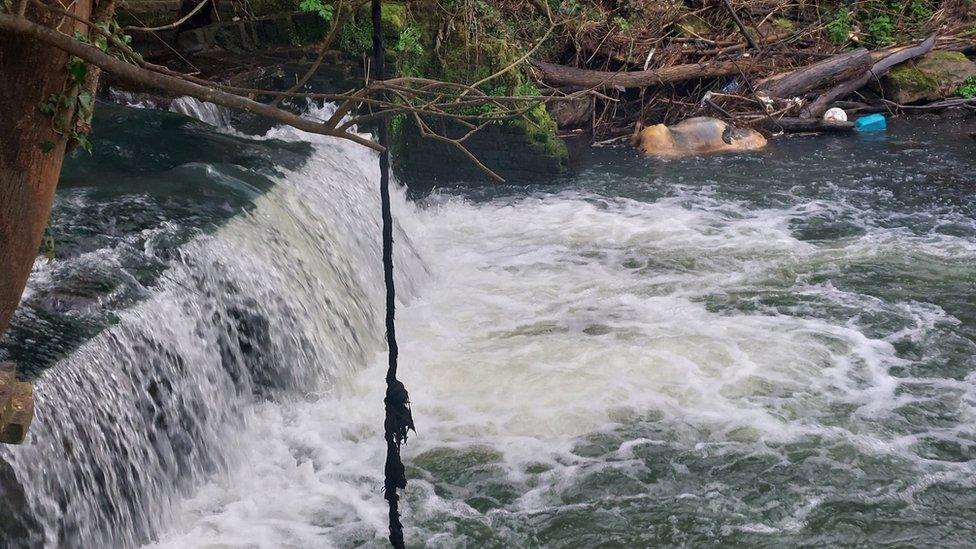Dead horse in River Stour continues to alarm residents
- Published

The body of a dead horse is yet to be removed from this stretch of river, three weeks after it was found
Residents living near a river in which a dead horse was discovered have said they are still struggling to get it removed three weeks after the find.
The animal was spotted near Wordsley Waterfall on the River Stour, Staffordshire, on 11 March.
So far, no emergency service, council or other agency has undertaken operations despite reports of odour.
South Staffordshire Council has said it "does not have a legal or statutory duty to remove it".
The carcass has become lodged among debris at the side of the river, near Stourbridge. The ownership of the horse and the circumstances of its demise are unclear.
Local residents say the smell from the body is "horrendous" and despite several social media appeals, the horse's owner is yet to come forward.
Sophie Edwards, from a local horse yard, has launched a campaign for the body to be taken away.
She told BBC WM: "We tried to contact every agency possible. They all passed it off to other people and we ended up going round in circles because no-one wanted to do anything about it.
"It has made us all quite emotional - it was once a pet and we think it should have the dignity it deserves and be disposed of in the correct way."
The campaigner says the area is popular with dog-walkers and swimmers who, she adds, have recently started avoiding the area.
The Environment Agency has said it is only able to respond to such incidents if the watercourse becomes blocked and poses a risk of flooding.
The Canal and River Trust told the BBC it did not manage the area of the River Stour where the body was found.
A spokesperson for South Staffordshire Council said the authority did "not have the necessary resources or expertise to handle the matter safely ourselves".
They added: "We do of course appreciate the sight of the carcass is unpleasant and ongoing work is being undertaken by officers to find a solution for its removal.
'Challenging'
"This is, however, proving extremely difficult. Accessing and removing the carcass is very challenging due to a lack of vehicle access making getting equipment on site difficult. The carcass is also lodged in overhanging trees in very close proximity to fast-flowing water."
The carcass did "not present a flooding or pollution risk", the council added, saying the potential safety risks for anyone tasked with the removal of the body must be considered accordingly.
Members of the public who are not "suitably trained and skilled" have been advised against trying to remove the horse themselves.

Follow BBC West Midlands on Facebook, external, Twitter, external and Instagram, external. Send your story ideas to: newsonline.westmidlands@bbc.co.uk
Related topics
- Published22 March 2023